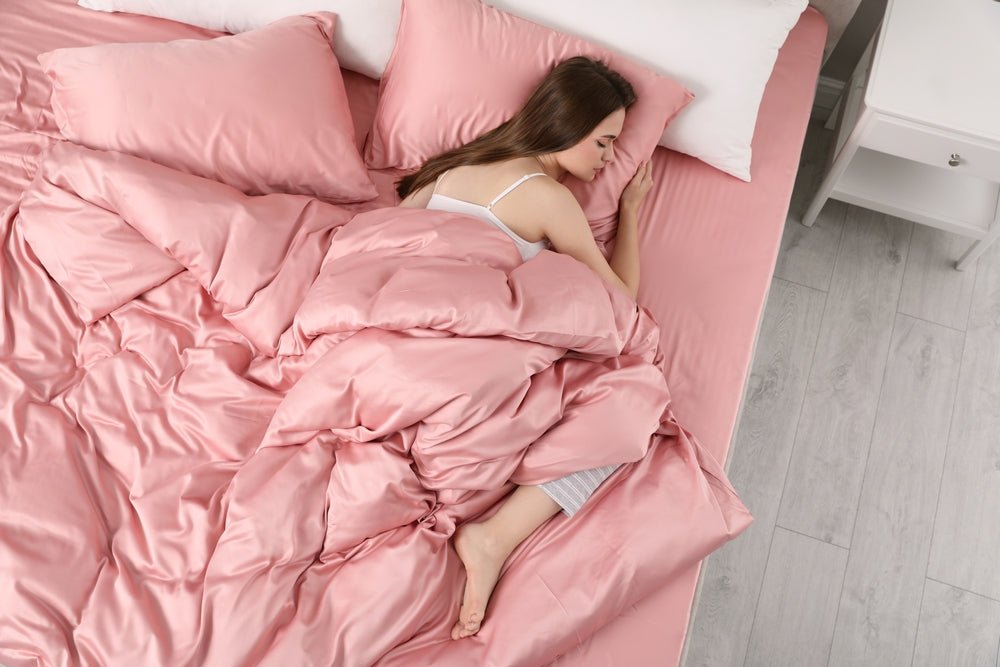Free U.S. Shipping On Orders Over $150

Duvet Cover Buying Guide: How to Choose a Duvet Cover that Improves Your Sleep
Posted on
A duvet cover protects your duvet or comforter from getting dirty. This reduces how often you need to wash the comforter, which increases its lifespan. It’s also a hassle to launder a comforter and can be expensive as well if you don't have a large enough washing machine at home. So the less you have to wash it, the better.
The kind of duvet cover you choose can affect your comfort in bed and how well you sleep. Below is a guide on how to choose the best type of duvet cover.
How Does a Duvet Cover Affect Sleep
Your mattress, bed sheets and the duvet insert have a major impact on how well you sleep. The duvet cover has a smaller impact but it can still cause serious sleep problems if you don't choose the right one.
One of the things a duvet cover can have an effect on is breathability. Some covers, especially those made from synthetic materials, have poor breathability. So they trap hot air under the duvet, making you hot and uncomfortable. Sleeping hot is a common cause of insomnia.
Even if you have a breathable comforter, the wrong duvet cover can cancel out its cooling benefits.
A duvet cover can also affect your ability to stay dry. A duvet cover that traps heat is also likely to make you sweat more. Some duvet covers also struggle to wick away sweat, leaving you feeling hot and clammy.
The texture and feel of a duvet cover is also important. A scratchy material makes it harder to sleep comfortably. Some duvet covers can also be problematic for people with allergies or sensitive skin.
Types of Duvet Covers
The most important consideration when shopping for a duvet cover is the material. It determines how breathable, cooling, sweat-wicking and comfortable the duvet cover is going to be.
Here are the different types of duvet cover materials, plus their pros and cons.
Cotton
Cotton is breathable and absorbs sweat, so it’s a great material for a duvet cover. A cotton duvet cover will keep you cool and absorb sweat off your skin. Cotton duvet covers are also fairly affordable especially compared to other natural options like linen or silk.
The main downside of a cotton duvet cover is that it can struggle to dry if you have serious night sweats. It will absorb sweat but then it holds onto it. If you sweat heavily in bed, pick a different duvet over. We recommend linen, bamboo or rayon.
When buying a cotton duvet cover, check the thread count. It doesn't need to be as high as with cotton sheets, but don’t go below 200. A 200-350 TC cotton duvet cover will feel soft and gentle on your skin.
Polyester
Polyester duvet covers are among the cheapest in the market. Polyester is also hardy, so you can wash the duvet cover often without worrying about damaging it.
On the downside, a polyester duvet cover can make you hotter since it has lower breathability. It will also struggle to wick away sweat, making it a bad pick if you have night sweats.
Microfiber
Microfiber is mostly polyester mixed with nylon or rayon. Microfiber duvet covers are softer, especially if you get one made with brushed microfiber. So if you want that velvety feel, microfiber is a good choice.
A microfiber duvet cover is a bit more breathable, but it can still make you too hot and sweaty especially if you are a hot sleeper or have night sweats.
Satin
Satin is a synthetic material that’s often marketed as being silk-like. It is smooth and glossy, but doesn't compare with actual silk when it comes to comfort.
A satin duvet cover can be good for your skin and hair because it has less friction. But it can also make you hot and sweaty because of its poor breathability and moisture absorption.
Only go for a satin duvet cover if you like the glossy look. But we recommend pairing it with breathable sheets to minimize discomfort.
Silk
Silk is the best choice if you want a luxury duvet cover. A mulberry silk duvet cover is pricey, but it offers the best in cooling, sweat-wicking and comfort.
Linen
Another great choice if you want a highly breathable and sweat-wicking duvet cover. The only downside of linen (other than its higher price tag) is that it almost always looks wrinkly. But some people love the lived-in look.
Rayon
Rayon duvet covers are made from plant-based fibers like bamboo, eucalyptus (Tencel) and beech. There are three types of rayon: viscose (cheapest), lyocell (most eco-friendly) and modal (strongest).
Rayon duvet covers are cheaper than all-natural duvet covers such as linen but more cooling and breathable than synthetic duvet covers. They also have excellent moisture-wicking capability, making them ideal for people with night sweats.
Final Thoughts
A good duvet cover can actually make your duvet or comforter more comfortable. So if you have a microfiber or down alternative duvet insert that makes you a bit too hot, it’s even more important that you get the right duvet cover that will help you sleep better.
Quick links
Contact
6063 Hudson Road #160
Woodbury, MN 55125
Yo@hercLeon.com
Leave a comment: